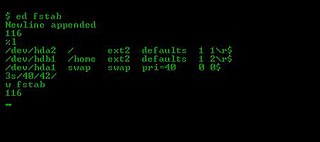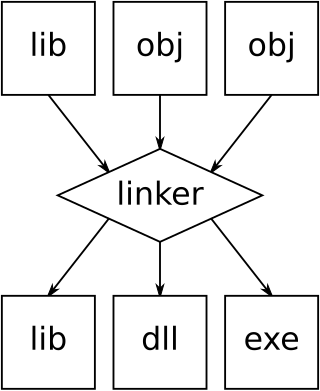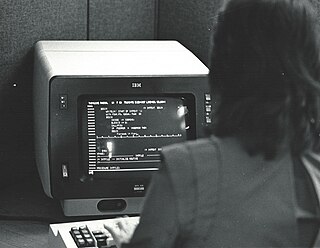Related Research Articles

ed is a line editor for Unix and Unix-like operating systems. It was one of the first parts of the Unix operating system that was developed, in August 1969. It remains part of the POSIX and Open Group standards for Unix-based operating systems, alongside the more sophisticated full-screen editor vi.
Edlin is a line editor, and the only text editor provided with early versions of IBM PC DOS, MS-DOS and OS/2. Although superseded in MS-DOS 5.0 and later by the full-screen MS-DOS Editor, and by Notepad in Microsoft Windows, it continues to be included in the 32-bit versions of current Microsoft operating systems.
A file manager or file browser is a computer program that provides a user interface to manage files and folders. The most common operations performed on files or groups of files include creating, opening, renaming, copying, moving, deleting and searching for files, as well as modifying file attributes, properties and file permissions. Folders and files may be displayed in a hierarchical tree based on their directory structure.

In computing, a linker or link editor is a computer system program that takes one or more object files and combines them into a single executable file, library file, or another "object" file.

A text editor is a type of computer program that edits plain text. Such programs are sometimes known as "notepad" software. Text editors are provided with operating systems and software development packages, and can be used to change files such as configuration files, documentation files and programming language source code.

vi is a screen-oriented text editor originally created for the Unix operating system. The portable subset of the behavior of vi and programs based on it, and the ex editor language supported within these programs, is described by the Single Unix Specification and POSIX.
In computing, the utility diff is a data comparison tool that computes and displays the differences between the contents of files. Unlike edit distance notions used for other purposes, diff is line-oriented rather than character-oriented, but it is like Levenshtein distance in that it tries to determine the smallest set of deletions and insertions to create one file from the other. The utility displays the changes in one of several standard formats, such that both humans or computers can parse the changes, and use them for patching.
Cut, copy, and paste are essential commands of modern human–computer interaction and user interface design. They offer an interprocess communication technique for transferring data through a computer's user interface. The cut command removes the selected data from its original position, and the copy command creates a duplicate; in both cases the selected data is kept in temporary storage called the clipboard. Clipboard data is later inserted wherever a paste command is issued. The data remains available to any application supporting the feature, thus allowing easy data transfer between applications.
In computing, Interactive System Productivity Facility (ISPF) is a software product for many historic IBM mainframe operating systems and currently the z/OS and z/VM operating systems that run on IBM mainframes. It includes a screen editor, the user interface of which was emulated by some microcomputer editors sold commercially starting in the late 1980s, including SPF/PC.

Sam is a multi-file text editor based on structural regular expressions. It was originally designed in the early 1980s at Bell Labs by Rob Pike with the help of Ken Thompson and other Unix developers for the Blit windowing terminal running on Unix; it was later ported to other systems. Sam follows a classical modular Unix aesthetic. It is internally simple, its power leveraged by the composability of a small command language and extensibility through shell integration.

Unix System V is one of the first commercial versions of the Unix operating system. It was originally developed by AT&T and first released in 1983. Four major versions of System V were released, numbered 1, 2, 3, and 4. System V Release 4 (SVR4) was commercially the most successful version, being the result of an effort, marketed as Unix System Unification, which solicited the collaboration of the major Unix vendors. It was the source of several common commercial Unix features. System V is sometimes abbreviated to SysV.

XEDIT is a visual editor for VM/CMS using block mode IBM 3270 terminals.
ex, short for EXtended, is a line editor for Unix systems originally written by Bill Joy in 1976, beginning with an earlier program written by Charles Haley. Multiple implementations of the program exist; they are standardized by POSIX.

JOE or Joe's Own Editor is an ncurses-based text editor for Unix systems, available under the GPL. It is designed to be easy to use.
SPF/PC is an MS-DOS-based text editor and file manager designed to have an interface that was familiar to those using mainframe SPF and ISPF.

The Berkeley Software Distribution or Berkeley Standard Distribution (BSD) is a discontinued operating system based on Research Unix, developed and distributed by the Computer Systems Research Group (CSRG) at the University of California, Berkeley. The term "BSD" commonly refers to its open-source descendants, including FreeBSD, OpenBSD, NetBSD, and DragonFly BSD.

Unix is a family of multitasking, multi-user computer operating systems that derive from the original AT&T Unix, whose development started in 1969 at the Bell Labs research center by Ken Thompson, Dennis Ritchie, and others.

A command-line interface (CLI) is a means of interacting with a computer program by inputting lines of text called command-lines. Command-line interfaces emerged in the mid-1960s, on computer terminals, as a user-friendly alternative to punched cards.
The History of the Berkeley Software Distribution begins in the 1970s.
References
- ↑ COPYING in se-3.0.1.tar.gz "The se source code and associated files are in the public domain. There are a few output files from autoconf/automake (configure, Makefile, etc) which contain copyright notices. Those notices give unlimited permission to copy and/or distribute the files, with or without modifications, as long as the notices are preserved."
- ↑ Jim Joyce (1984). "Interview with Bill Joy". Unix Review. Archived from the original on 2012-02-10.